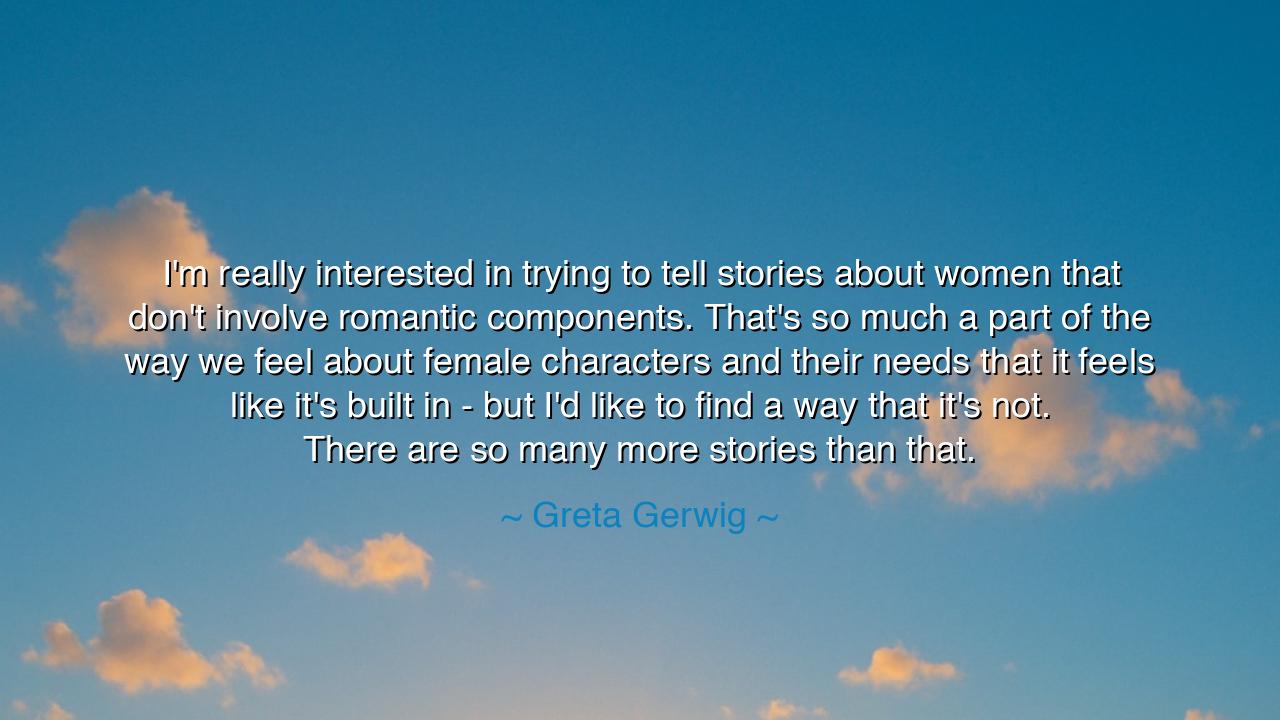
I'm really interested in trying to tell stories about women that
I'm really interested in trying to tell stories about women that don't involve romantic components. That's so much a part of the way we feel about female characters and their needs that it feels like it's built in - but I'd like to find a way that it's not. There are so many more stories than that.






In the words of Greta Gerwig, a voice of fierce clarity and creative daring, there is spoken a truth that challenges the foundations of storytelling: “I’m really interested in trying to tell stories about women that don’t involve romantic components. That’s so much a part of the way we feel about female characters and their needs that it feels like it’s built in—but I’d like to find a way that it’s not. There are so many more stories than that.” This declaration is both rebellion and vision, a refusal to allow half of humanity to be confined to one narrow narrative.
The ancients knew well the power of story to define lives. In their epics, women were often reduced to prizes or temptations: Helen, whose beauty sparked war; Dido, whose love destroyed her; Penelope, defined only by her waiting. Their fates were tethered to men, their stories consumed by romantic components. And yet, even in those times, there were glimpses of more: Atalanta, who raced with warriors; Sappho, who sang of longing with her own voice. Gerwig, in her modern calling, seeks to revive and expand that ancient spark—to tell the stories of women not as satellites to love, but as stars in their own right.
To imagine female characters without romance is to imagine them as fully human, with desires that extend beyond marriage or passion. It is to ask: what of their ambitions, their struggles, their friendships, their creativity, their battles within and without? Why must their narratives be shackled to the search for love when the breadth of human experience is infinite? Gerwig’s words are a battle cry against centuries of limitation, a demand that the stage of story open wider to contain the richness of women’s lives.
History gives us examples of those who lived outside the mold. Consider Joan of Arc, who rose not as lover or bride but as leader and warrior, guiding armies and defying kings. Her story is not of romance, but of faith, courage, and tragedy. Or consider Marie Curie, whose tale is not one of courtship but of discovery, of burning devotion to science that changed the world. These lives remind us that the stories of women are vast, that to reduce them to romance alone is to silence truths that shape humanity itself.
The deeper meaning of Gerwig’s words is that stories themselves are instruments of power. The tales we tell shape what we believe is possible. If every story of a woman ends in romance, then generations of women are taught that romance is their destiny, their purpose, their cage. But if we tell stories of ambition, of art, of defiance, of leadership, then new destinies are opened, and the imagination of both women and men is set free. The work of storytelling becomes not only entertainment, but liberation.
The lesson is clear: seek out and honor stories that break the mold. When you read, when you watch, when you tell tales yourself, ask whether they reflect the fullness of life or merely echo the narrow traditions of the past. Support voices that expand the field of vision. Celebrate the female characters who are artists, leaders, seekers, wanderers—not only lovers. For in doing so, you widen the path for those who will walk after you.
Therefore, O listener, take these words as both challenge and invitation. Do not accept the smallness of a single story. Demand more. Tell more. Live more. For as Gerwig reminds us, there are indeed “so many more stories than that.” To honor them is to honor the truth that women, like men, are vast as oceans, full of storms, full of calm, full of destinies that cannot be contained by love alone. And in this recognition lies not only justice, but beauty: the beauty of a world whose stories are finally as infinite as the lives that inspire them.






AAdministratorAdministrator
Welcome, honored guests. Please leave a comment, we will respond soon